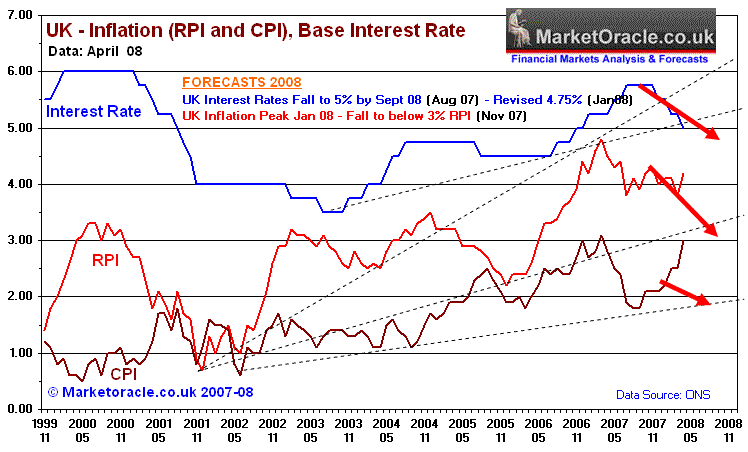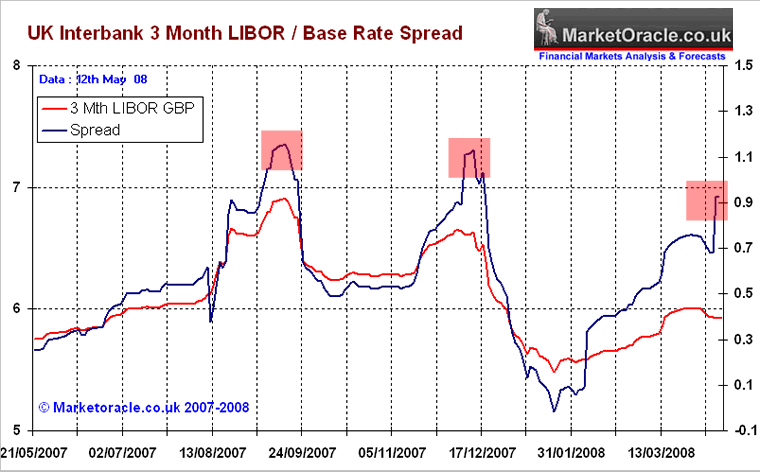UK Flawed Inflation Measure Explodes Higher, 3% CPI, 4.2% RPI
Economics / Inflation May 13, 2008 - 07:33 AM GMTBy: Nadeem_Walayat

 The Consumer Price Index (CPI) leapt higher to 3% in April from 2.5% in March, nearly hitting the Bank of England's letter writing trigger level of 3.1%. This confirms the Market Oracle expectations for a surge in UK inflation as not only the UK but all of the worlds major governments are engaged in the process of rampant money supply growth that is feeding through in higher inflation as too much cash is chasing too few goods. This is most visible in the commodities markets where strong price fundamentals coupled with the Bank of England's money supply printing presses running at full stream as evidenced by the £100 billion of new debt loaned to the banking sector in recent months.
The Consumer Price Index (CPI) leapt higher to 3% in April from 2.5% in March, nearly hitting the Bank of England's letter writing trigger level of 3.1%. This confirms the Market Oracle expectations for a surge in UK inflation as not only the UK but all of the worlds major governments are engaged in the process of rampant money supply growth that is feeding through in higher inflation as too much cash is chasing too few goods. This is most visible in the commodities markets where strong price fundamentals coupled with the Bank of England's money supply printing presses running at full stream as evidenced by the £100 billion of new debt loaned to the banking sector in recent months.
In a recent article I speculated that Gordon Brown may embark on an strategy of throwing money at the voters in an attempt to buy the next election during 2009-2010, that this would be highly inflationary and that the Bank of England may be forced to abandon its 2% inflation target. Today's statistics are an open warning of the consequences of such a strategy, where even an heavily manipulated inflation measure that does not take into account mortgage and council tax costs still manages to evade government targets.
The CPI a Flawed Inflation Measure
The true rate of UK inflation is at least 1% above the RPI measure of 4.2%, therefore at least at 5.2%. There are many flaws in the CPI index which are not only limited to not taking account of many costs such as mortgage interest payments and council tax. But also include deflationary costs such as big item household purchases and clothing which during the current economic downturn and housing bear market are experiencing price cuts due to lack of consumer demand. Therefore the CPI is including falling prices for goods that are basically not being bought, whilst at the same time costs for food and fuel have leapt by more than 20% and are thus being under represented by both the CPI index and RPI Index, which is the primary reason for the loss of confidence in the official statistics that are designed by governments to produce benign inflation statistics in an attempt at controlling wage inflation as a lesson learned from the 1970's and 1980's stagflation era.
The consequences of the under-reporting of real inflation is the huge build up in personal debt that attempts to fill the gap between real inflation and official inflation. However, the credit crisis has ensured that borrowing facilities such as using ones home as an ATM card by the means of equity withdrawals is no longer an option for many consumers, therefore this implies increased deflation in many sectors of the consumer economy going forward, which is expected to bring down the official inflation statistics later in the year.

The Market Oracle forecast as of Nov 07, is for RPI inflation to fall towards 3% by Nov 08. Despite the current surge and given the deflationary forces mentioned above, this 'should' bring the official inflation figures lower towards the forecast date. Also, UK interest rate forecast trend remains on target for rates to hit 4.75% by Sept 08.
The consequences of this surge in headline inflation for Gordon Brown are that the government can expect more rebellion amongst public sector workers as they demand higher pay rise deals in the face of much higher 'real' inflation as the recent teachers demonstrated. (24th April 08 - Teachers Strike as Real Inflation is Far Higher than the CPI)
LIBOR Interbank Interest Rates

At the time of writing an update to the 3 month LIBOR rate is still pending as reports suggest the British Bankers Association is about to revaluate the way it compiles the LIBOR rate due to the current procedures having been discredited as the reporting banks tend to under report the true interbank interest rates so as to under play the impact of the credit crisis. Despite this, the official interbank rates remain at credit crisis extremes as the above graph illustrates, the expectation is that the 3 month GBP LIBOR rate will have jumped on the worse than expected inflation news. For more on problems with the LIBOR rate see Credit Crisis SCOOP- LIBOR Is Now Irrelevant to Derivatives Pricing
By Nadeem Walayat
Copyright © 2005-08 Marketoracle.co.uk (Market Oracle Ltd). All rights reserved.
Nadeem Walayat has over 20 years experience of trading, analysing and forecasting the financial markets, including one of few who both anticipated and Beat the 1987 Crash. Nadeem is the Editor of The Market Oracle, a FREE Daily Financial Markets Analysis & Forecasting online publication. We present in-depth analysis from over 150 experienced analysts on a range of views of the probable direction of the financial markets. Thus enabling our readers to arrive at an informed opinion on future market direction. http://www.marketoracle.co.uk
Disclaimer: The above is a matter of opinion provided for general information purposes only and is not intended as investment advice. Information and analysis above are derived from sources and utilising methods believed to be reliable, but we cannot accept responsibility for any trading losses you may incur as a result of this analysis. Individuals should consult with their personal financial advisors before engaging in any trading activities.
Attention Editors and Publishers! - You have permission to republish THIS article if published in its entirety, including attribution to the author and links back to the http://www.marketoracle.co.uk . Please send an email to republish@marketoracle.co.uk, to include a link to the published article.
Nadeem Walayat Archive |
© 2005-2022 http://www.MarketOracle.co.uk - The Market Oracle is a FREE Daily Financial Markets Analysis & Forecasting online publication.


